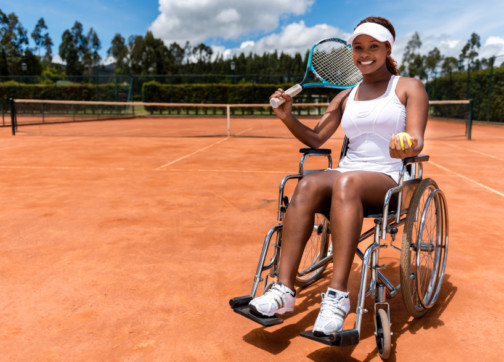Sports as a Platform for Social Good

Sports have always been a huge part of my life.
Desperate for a way to channel my energy, my parents enrolled me in gymnastics when I was young. Fearless, I literally threw myself into the sport, dazzled by Olga Korbut, Nellie Kim and the perfection of Nadia Comaneci, and trying to replicate what I saw many Saturday afternoons on the Wild World of Sports. I did ok, all things considered, and — although I traded in my leotards for soccer cleats in 7th grade — I had learned a tremendous amount at a young age, about “the thrill of victory and the agony of defeat” (with a nod to Jim McKay), about how to handle nerves, and about performing in front of people. These lessons helped me as I took to the field, the only girl on boys’ soccer teams, first local and then in a club travel league. As you can imagine, I wasn’t exactly popular, when I was played over a boy on the team or when I managed to win the ball from an opponent. Egos were definitely bruised, but I loved the sport and still do, as a former player, coach, referee and now spectator at my sons’ matches.
Reflecting on my life from where I sit today, I can honestly say that sports helped me become who I am. This is a such a positive thing in a world that often gives us stories about sports that aren’t so good, about athletes living lives of excess, of drug scandals, corruption and more. But it’s important not to forget the vital role sports play in society and to encourage ways they can advance social good. I had a huge dose of this goodness this summer at the DOHA Goals (Gathering of All Leaders in Sport) Forum, which aims to inspire “the creation of communities, opportunities and initiatives for growth and progress through sport.” The gathering hit on four themes, all with sports at the center – building movements, creating bridges across divides in society, being inclusive, and being a catalyst for transformation and change.
Not surprisingly, Nelson Mandela’s famous quote on sport having the power to “change the world” was used as a central idea. The gathering brought athletes, owners, athletic directors, media and others to the stage to share stories of sport as a platform for change. Although some stories were delightful, many were filled with pain and the challenges people faced as they pushed on barriers we take for granted today. Here are some of the amazing people I heard that day and what I took away:
- Daina Shilts, Special Olympics and X-Games snow boarder, on how “being inclusive matters every day, not just in sports. It makes those with intellectual disabilities thrive.” She told us that “sport has taught me a bucket load of things, to try to aim to be better in life. I’m competing for the finish, to feel good, not just for first, second or third place. I learned to go much further than winning.”
- Jamaal Charles, running back for the Kansas City Chiefs, on helping individuals find what makes them special. “Everyone’s different. God made us all special. Some have resources, some don’t.” Jamaal, who has intellectual disabilities, first learned he had a gift as an athlete when competing as a child in the Special Olympics. He has only just begun to speak openly about his challenges. “Sports helped me get the monkey off my back.”
- Abby Wambach on economic inequality between men’s and women’s soccer (the U.S. Women’s National team won 1/17th the winnings of the last men’s World Cup Champions). She wants “to leave the sport better than I found it” and be a part of the economic change in women’s sports. She urged us not to think she is a good person simply because she does something “extraordinary,” but instead, to look at her actions off the field.
- Jason Collins, former pro basketball player and NBA Cares Ambassador, on inclusion. After keeping his personal life a secret while others fought for equality rights that would benefit him, he came out as gay (making him the first athlete playing for one of the four major pro leagues in North America to do so) in a cover story in Sports Illustrated in 2013. He talked about the importance of putting your whole self in what you do. If you can’t be honest with the world about who you are, you can’t perform at the top of your game no matter what you do.
It’s not hard, reading these vignettes, to see how sports either provided an answer to a challenge or a platform to be able to do good. Nelson Mandela certainly believe this, so I’ve leave you with his words – “Sport can create hope where once there was only despair. It is more powerful than governments in breaking down racial barriers. It laughs in the face of all types of discrimination.”
